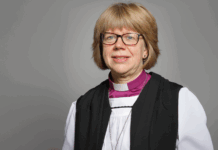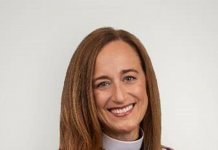The following words were addressed to those attending the Keep Rebuilding Bridges conference on October 5, 2018. Baron Carey of Clifton was the Archbishop of Canterbury from 1991 to 2002.
The Truth will set you free
I am delighted to offer a contribution to this Conference on Rebuilding Bridges and thank Richard Symonds for his invitation and for all he has done and continues to do, to clear George Bell’s name. It is good to see in our audience Dr. Ruth Hildebrandt Grayson, the daughter of Bishop Bell’s close friend, Franz Hildebrandt. We look forward to hearing her later.
Now, I am uncomfortably aware that my presence here raises two unrelated questions.
I have been accused many times over the past few years of presiding over a ‘cover-up’ of Bishop Peter Ball’s crimes. Peter Ball misused his office as a bishop to abuse, and indecently assault young people who were exploring vocations into Christian ministry. There was, of course, no cover-up. We now know that the police at the time examined many allegations against Ball and together with prosecutors only charged him with a caution. This decision was very much of its time. But later even after I had left office other people, including police, had an opportunity to look at all the evidence that was in our hands at Lambeth to bring Peter Ball to justice, yet they did not do so until Chichester Diocese passed on its files and Peter Ball was finally brought to justice in 2015. I and my colleagues at the time did make mistakes and rightly my actions are being subjected to public scrutiny – a review by Dame Moira Gibb and the IICSA Inquiry. I have cooperated willingly, openly and honestly with this scrutiny at every stage. I will take every opportunity I can to publicly apologise to the victims of Peter Ball for the mistakes I made in the 1990s which have caused them such pain to this day. I will say no more about this matter because IICSA is still to report on this next year.
The other question is about the role of retired bishops and archbishops. ‘Don’t spit on the deck as you leave’ is usually good advice.
But I am not retired from ministry. I am still active in ministry, still a member of the church and by Her Majesty’s invitation a member of the House of Lords. If it is permissible to speak out on public affairs, as I do from time to time, then it is permissible for me to speak out on matters of justice when so few others will.
Over the last 12 months or so I have had a recurring disturbing worry. It is the ‘nightmare’ that in spite of a very happy and faithful marriage to the same woman for nearly 60 years some 50 or so years from the point of my death, rumours will circulate that I was an abuser of others. The rumours will reach such a pitch that the Church to which I had given my life will capitulate, pay out money and believe the falsehoods. Who would defend me?
This could happen to anyone of us – male or female. It became a reality for one of the great giants of Anglicans, namely George Bell who died 70 years ago and whom we honour today. I remember the time when I was Archbishop visiting Morton’s Tower in Lambeth Palace where Bell’s works were stored. I was amazed by the scale of his correspondence and work. It expressed his energy, output and commitment to public affairs. He was never afraid to be unpopular because his commitment was to the gospel of Jesus Christ and its truth. Before ecumenism became a fashionable word he had already embraced a deep commitment to other Christians and Churches. Whilst anti-Jewish hatred continued to change the face of Germany and western Europe, Bell instinctively turned his face against the ugliness of anti-Semitism. I read his correspondence with Dietrich Bonhoeffer and marvelled at their deep friendship and common faith. At a time of understandable patriotism and jingoism on the part of the British people, Bell courageously argued against unacceptable retribution against Germany. Winston Churchill turned against him and, we understand, put paid to any prospect of Bell becoming Archbishop because of his opposition to carpet bombing.
But Bell was more than an energetic, courageous and knowledgeable public figure. He was a man rooted in prayer and worship; a high churchman who loved the order and beauty of liturgy. In his exceptionally busy life he was supported loyally, deeply and lovingly by his wife, Henrietta. She was always alongside him, as were his chaplains who were there to take some of the burden of his high public office.
And then, fifty-seven years after his death, his own diocese which he served faithfully and greatly loved – supported by the Archbishop of Canterbury and the House of Bishops – made an announcement which was likely to affect Bell’s reputation forever more. The announcement was widely interpreted by press and public alike as an accusation that Bell had sexually abused a child between 1949 and 1953. Strangely, church leaders deny that they have ever said that Bell was guilty of the abuse, but this is surely disingenuous. In the Archbishop of Canterbury’s words, a ‘cloud’ hangs over his name.
In that initial announcement, very few details were given but it was clear that an unspecified sum of money had been given to the complainant. The Church said it had decided to give this compensation on the basis of the ‘balance of probabilities’. But even on this evidential basis, arguments for the defence should have been heard. Previously, no other accusations – or even rumours – had ever been heard against Bell. And on the basis of this one unproven, and probably unprovable allegation, his name was removed from buildings and institutions named after him.
A recent detailed review of the case by Lord Carlile showed that no significant effort had been made by the Church to consider any evidence that might have supported Bell’s innocence. In particular, those investigating did not consult Bell’s biographer, Andrew Chandler, nor the living people who worked with him at that time.
George Bell’s cause was given no legal advocate. Instead, in a process, which I referred to in the House of Lords in 2016 as ‘having the character of a kangaroo court’ it seems as though the ‘victim’ was automatically believed. The normal burden of proof was reversed and it was considered ‘wicked’ to doubt the veracity of the allegations.
Dr Andrew Chandler in his excellent biography of George Bell states: ‘We are asked to invest an entire authority in one testimony and to dismiss all the materials by which we have come to know the historical George Bell as mere figments of reputation.’ Of course, if Bell was guilty, his high reputation should not protect him. But we have not been given the chance to establish fairly whether he was.
In an appendix devoted to the controversy, Chandler notes that Bell’s 368 volume archive contains his personal notebooks and pocket diaries from 1919 to 1957, in which he kept track of all his appointments and engagements. He notes Bell’s “conspicuously high view of the standards required by his office,” and adds that Bell was almost constantly observed, that he participated in many disciplinary processes for clergy, that he maintained what seemed like a happy marriage, and that he worked almost continually in the presence of his wife, secretary, domestic chaplain, or driver.
Chandler interviewed the only member of Bell’s circle who was then still alive, Adrian Carey, his domestic chaplain from the early 1950s. This man “is firm, indeed emphatic, that ‘no child or young teenager ever entered during my two years as Chaplain, except on the day in January chosen for the parish Christmas party which he and Mrs Bell laid on every year for the children of the clergy’”.
Thankfully an outcry came against such a miscarriage of justice and I was delighted in 2016 to be invited to join the George Bell group, led by Andrew Chandler, to fight to clear George Bell’s name.
It was a relief to us all when the Bishop of Chichester asked Lord Carlile of Berriew QC, a well-known independently-minded human rights lawyer, to conduct an independent review which he did thoroughly and authoritatively. His report concluded that the “core group” established by the church to consider the claims “failed to follow a process that was fair and equitable to both sides”.
“The church, understandably concerned not to repeat the mistakes of the past, when it had been too slow to recognise that abuse had been perpetrated by clergy and to recognise the pain and damage caused to victims, has in effect over-steered in this case.
“In other words, there was a rush to judgment: the church, feeling it should be both supportive of the complainant and transparent in its dealings, failed to engage in a process which would also give proper consideration to the rights of the bishop. Such rights should not be treated as having been extinguished on death.”
He added: “In my view, the church concluded that the needs of a living complainant who, if truthful, was a victim of very serious criminal offences were of considerably more importance than the damage done by a possibly false allegation to a person who was no longer alive.”
Carlile said the purpose of his review was not to determine the truthfulness of the allegations nor to rule on Bell’s guilt or innocence.
He went on, “even when the alleged perpetrators have died, there should be methodical and sufficient investigations into accusations leveled against them”.
In this case, “the truth of what Carol was saying was implicitly accepted without serious investigation or inquiry. I have concluded this was an inappropriate and impermissible approach.”
What then followed was to my mind more damaging to the Church than to George Bell. Instead of this logically leading to the rehabilitation of George Bell’s reputation, the Church compounded the problem further by apologizing for the procedures that had been found wanting by the Carlile review, but nevertheless refused to retract its conclusion that George Bell was in all probability guilty of the abuse.
In the words of the Archbishop of Canterbury a ‘significant cloud’ hangs over his name. The Archbishop bluntly added: ‘he is accused of great wickedness’.
What is deeply unsatisfactory is that no explanation is given and no evidence for these conclusions. If the Carlile report revealed how biased and unjust were the conclusions of the Core Group, how can the Archbishop, the Bishop of Chichester and Bishop of Bath and Wells continue to unblushingly assert that George Bell’s reputation remains under a cloud?
Now, it gives me no pleasure to note that the Archbishop of Canterbury has received harsh criticism from a number of leading historians and theologians and, sadly, his response has been so far unsatisfactory. Those of us still committed to the national Church remain horrified that not more has been done to explain his remark that ‘a cloud remains’. At the very least justice demands it.
Perhaps an explanation lies in a further allegation which has come out of the blue, at the beginning of this year, before the Carlile review could be properly debated in General Synod. But after the first core group debacle, can we really have confidence that the Church can investigate this competently itself?
Regarding the current investigation at least this time we know that George Bell’s niece is to be represented by one of the George Bell Group, Desmond Browne QC, and that Andrew Chandler’s expertise and knowledge of Bell is being utilised. But a gnawing and perhaps understandable suspicion remains that the hierarchy are hoping we will all forget and the ‘can’ will be kicked further down the road. It is a sorry mess: a great man’s name has been traduced, justice has been denied and the good name of George Bell rubbished.
The Archbishop has rightly made mediation and reconciliation a major plank of his ministry, and I hope he will reach out to all those who are dismayed by this treatment of Bell and consider again his judgement of Bishop George Bell.
However, one of the matters I am most dismayed by is the silence over these concerns by the House of Bishops. The Church of England has always been respected for scholarship, theological exploration and independent thought. George Bell stands out as a pre-eminent scholar-bishop of the 20th century who engaged in public debate within the church and nation – frequently disagreeing with his episcopal colleagues.
In my time as Archbishop I served with colleagues of great scholarship and distinction including John Habgood, David Hope, Tom Wright, Mark Santer, Michael Nazzir-Ali, Peter Selby, Richard Harries, David Jenkins, Hugh Montefiore, David Sheppard, Simon Barrington Ward, and John Taylor of St. Alban’s and many others. These were bishops who prized justice and spoke out when they saw injustice. Bishops were prepared to speak out even against their own hierarchy – and they did not always agree with me.
So why the silence from the House of Bishops? Each member must know that he or she is implicated indirectly in this condemnation of Bell. Only one bishop has distanced himself from the Archbishop’s conclusion, but I understand that at least six others disagree with him. Unity, and collegiality are good things but never should they replace what is right and true. ‘Collegiality’ is not to be mistaken for ‘collective cabinet responsibility’ or ‘party discipline’.
So it is right to press the Bishops to declare themselves. Do you share the opinion that a significant cloud hangs over George Bell’s name? Do you agree that he is guilty of great wickedness? Please tell us what you think. At the February Group of General Synod Martin Sewell was told that ‘the House of Bishops is accountable for safeguarding in the Church of England’. If that is the case, why the silence? Is it an honorable thing to be silent on a matter so crucial as this? If the bishops are at one with the Archbishop of Canterbury’s declaration that a ‘cloud hangs’ over George Bell’s reputation and that ‘he is accused of great wickedness’, let them says so in a collective declaration of support for the Archbishop’s view.
It is because we all make mistakes that we need a church that preaches grace, forgiveness, repentance and new life. I see very little of grace in the way that the Church of England has handled allegations against George Bell. Indeed, it is shaming because it is unjust. We know we can do better. That is why this conference talks about rebuilding bridges, and that is why many of us will continue to fight for justice for George Bell.
However, I want to end on a positive note. Rebuilding Bridges is central to the Christian faith and that is what we all want to do. Let me offer three points:
I believe the George Bell case and also the Peter Ball investigation makes the argument for outsourcing investigations in the case of accusations of sexual misconduct. It is not because Archbishops and bishops can’t be trusted to have an important role in safeguarding, rather it is because we are too close to the clergy concerned and very likely to defend instinctively the institution, rather than actively promote an unbiased and independent approach.
Secondly, George Bell was a man of the Church, passionate about its witness and unity. Here we are today with declining numbers of worshippers, with no clear evangelistic programme, and no apparent plan to reach the young. The gap between Church and society is widening all the time. Yes, I know that great work is going on and not all churches are declining. It grieves us all that this major squabble is taking up so much time and energy when our gaze should be directed away from ourselves. The supporters of Bishop George Bell desire wholeheartedly to speak with one voice with the Archbishop and the House of Bishops. Reconciliation would certainly send out a great signal of overcoming a major barrier to our unity, which of course is part of our mission.
A third positive sign is an attractive idea that Dr. Ruth Hildebrandt Grayson is going to offer later and I do not want to steal her thunder in any respect. As I understand it, she is going to suggest a way of continuing Bishop George Bell’s work in the diocese.
Let me close my remarks with George Bell’s own words: words we should all heed, and which should guide our attempts to clear his name: ‘To despair of being able to do anything, or refuse to do anything, is to be guilty of infidelity’.
George Carey




[…] Lord Carey calls for Church of England to outsource abuse investigations […]